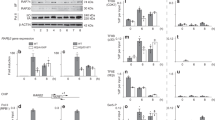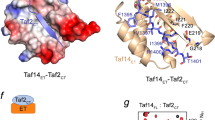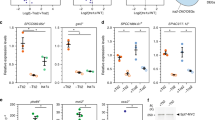Abstract
TRANSCRIPTION initiation by RNA polymerase II is effected by an ordered series of general factor interactions with core promoter elements (leading to basal activity) and further regulated by gene-specific factors acting from distal elements1. Both the general factor TFIID (refs 2,3), including the constituent TBP (TATA-binding polypeptide)4–7 and associated factors8, and the interacting factor TFIIB (refs 9–11) have been implicated as targets for various activators. Towards an understanding of the basis for activator function, including the multiplicity of TBP interactions, we have now identified mutations in yeast TBP that selectively block activator (GAL4-VP16)-dependent but not basal transcription. We further show an effect of GAL4-VP16 on TFIIB recruitment to early preinitiation complexes, and that recruitment is disrupted by TBP mutations that impair its interactions with VP16 (L114K), TFIIB (L189K) or an unidentified component (K211L). Thus, GAL4-VP16 function seems to involve both direct interactions with TBP and a corresponding induction (or stabilization) of an activation-specific TBP–TFIIB–promoter complex.
This is a preview of subscription content, access via your institution
Access options
Subscribe to this journal
Receive 51 print issues and online access
$199.00 per year
only $3.90 per issue
Buy this article
- Purchase on Springer Link
- Instant access to full article PDF
Prices may be subject to local taxes which are calculated during checkout
Similar content being viewed by others
References
Roeder, R. G. Trends biochem. Sci. 16, 402–427 (1991).
Horikoshi, M., Hai, T., Lin, Y.-S., Green, M. R. & Roeder, R. G. Cell 54, 1033–1042 (1988).
Workman, J. L., Abmayr, S. M., Cromlish, W. A. & Roeder, R. G. Cell 55, 211–219 (1988).
Ingles, C. J., Shales, M., Cress, W. D., Triezenberg, S. J. & Greenblatt, J. Nature 351, 588–590 (1991).
Lee, W. S., Kao, C. C., Bryant, G. O., Liu, X. & Berk, A. J. Cell 67, 365–376 (1991).
Horikoshi, N. et al. Proc. natn. Acad. Sci. U.S.A. 88, 5124–5128 (1991).
Lieberman, P. M. & Beck, A. J. Genes Dev. 5, 2441–2454 (1991).
Goodrich, J. A., Hoey, T., Thut, C. J., Admon, A. & Tjian, T. Cell 75, 519–530 (1993).
Lin, Y.-S. & Green, M. R. Cell 64, 971–991 (1991).
Choy, B. & Green, M. R. Nature 366, 531–536 (1993).
Kim, T. K. & Roeder, R. G. Proc. natn. Acad. Sci. U.S.A. (in the press).
Flanagan, P. M., Tschochner, H., Kelleher, R. J. III, Sayre, M. H. & Kornberg, R. D. Proc. natn. Acad. Sci. U.S.A. 89, 7659–7663 (1992).
Yamamoto, T. et al. Proc. natn. Acad. Sci. U.S.A. 89, 2844–2848 (1992).
Meisterernst, M. & Roeder, R. G. Cell 67, 557–567 (1991).
Lee, D. K., DeJong, J., Hashimoto, S., Horikoshi, M. & Roeder, R. G. Molec. cell. Biol. 12, 5189–5196 (1992).
Nikolov, D. B. et al. Nature 360, 40–46 (1992).
Kim, Y., Geiger, J. H., Hahn, S. & Sigler, P. B. Nature 365, 512–520 (1993).
Keaveney, M., Berkenstam, A., Feigenbutz, M., Vriend, G. & Stunnenberg, H. G. Nature 365, 562–566 (1993).
Ptashne, M. A Genetic Switch, Gene Control and Phage 1 (Cell Press and Blackwell Scientific, Cambridge, 1986).
Schena, M., Freedman, L. P. & Yamamoto, K. R. Genes Dev. 3, 1590–1601 (1989).
Kassavetis, G. A. et al. Cell 71, 1055–1064 (1992).
Hahn, S. Nature 363, 672–673 (1993).
Flanagan, P. M., Kellerher, R. J. III, Sayre, M. H., Tschochner, H. & Kornberg, R. D. Nature 350, 436–438 (1991).
Berger, S. L. et al. Cell 70, 251–265 (1992).
Kim, T. K. & Roeder, R. G. J. biol. Chem. 268, 20866–20869 (1993).
Kim, T. K. & Roeder, R.G. Nucleic Acids Res. 22, 251 (1993).
Chasman, D. I., Leatherwood, M. C., Carey, M., Ptashne, M. & Kornberg, R. D. Molec. cell. Biol. 9, 4746–4749 (1989).
Kim, T. K. & Roeder, R. G. J. biol. Chem. 269, 4891–4894 (1993).
Auble, D. T. & Hahn, S. Genes Dev. 7, 844–856 (1993).
Ranish, J. A., Lane, W. S. & Hahn, S. Science 255, 1127–1129 (1992).
Author information
Authors and Affiliations
Rights and permissions
About this article
Cite this article
Kim, T., Hashimoto, S., Kelleher, R. et al. Effects of activation-defective TBP mutations on transcription initiation in yeast. Nature 369, 252–255 (1994). https://doi.org/10.1038/369252a0
Received:
Accepted:
Issue Date:
DOI: https://doi.org/10.1038/369252a0
This article is cited by
-
Characterization of tTA and its functional domain in tetracycline repressor-mediated gene repression system
Archives of Pharmacal Research (1998)
-
Transcriptional activation by recruitment
Nature (1997)
-
A kinase–cyclin pair in the RNA polymerase II holoenzyme
Nature (1995)
-
Model for binding of transcription factor TFIIB to the TBP-DNA complex
Nature (1995)
-
Clamping the TBP stirrup
Nature (1995)
Comments
By submitting a comment you agree to abide by our Terms and Community Guidelines. If you find something abusive or that does not comply with our terms or guidelines please flag it as inappropriate.



